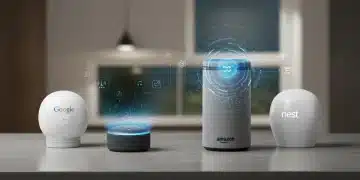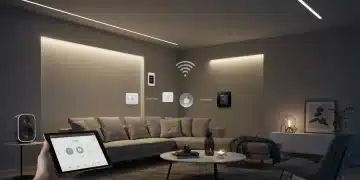Smart Smoke Detectors: A Comprehensive Review & Upgrade Guide
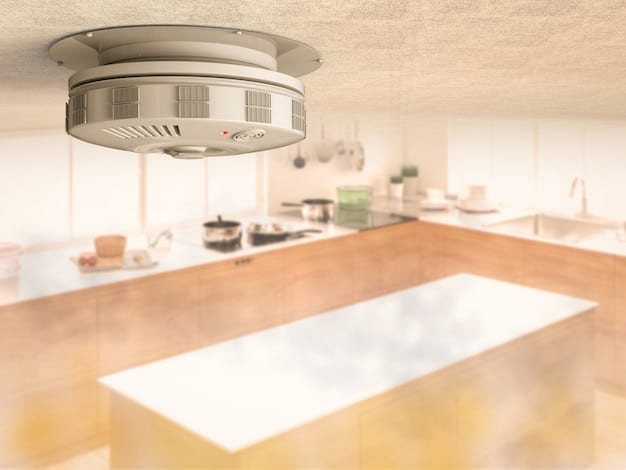
Smart smoke detectors offer advanced features like smartphone connectivity, voice alerts, and fewer false alarms, but their higher cost and potential privacy concerns raise the question: Are they worth the upgrade?
Are you considering upgrading your home’s safety with smart smoke detectors? This comprehensive review will delve into their features, benefits, and drawbacks to help you decide if they’re the right choice for you.
What Are Smart Smoke Detectors?
Smart smoke detectors are advanced versions of traditional smoke detectors, enhanced with modern technology for improved functionality and user experience. They go beyond simply detecting smoke and sounding an alarm.
These devices often include features such as:
Key Features of Smart Smoke Detectors
- Smartphone Connectivity: Receive alerts on your smartphone, even when you’re away from home.
- Voice Alerts: Provide clear, spoken warnings instead of just a loud beep.
- Interconnectivity: Connect with other smart devices in your home for a comprehensive safety system.
- Fewer False Alarms: Utilize advanced sensors to reduce the likelihood of nuisance alarms caused by cooking or steam.
- Self-Testing: Automatically test their functionality and battery life, alerting you to any issues.
Smart smoke detectors represent a significant step forward in home safety technology, offering enhanced features and greater peace of mind compared to their traditional counterparts. They aim to provide more reliable detection and more effective alerts, potentially saving lives and minimizing property damage.
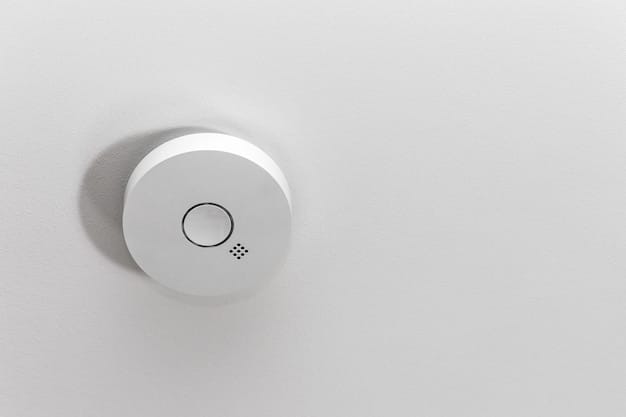
Benefits of Upgrading to Smart Smoke Detectors
Upgrading to smart smoke detectors can provide numerous benefits that traditional detectors simply can’t match. These advantages range from improved alert systems to enhanced convenience and peace of mind.
Here are some key reasons why upgrading might be a worthwhile investment:
Real-Time Alerts on Your Smartphone
One of the most significant advantages is the ability to receive real-time alerts on your smartphone. Whether you’re at work, on vacation, or simply in another part of the house, you’ll be notified immediately if smoke or carbon monoxide is detected. This can be crucial for taking swift action, especially when you’re away from home.
Reduced False Alarms
Traditional smoke detectors are notorious for sounding false alarms due to cooking fumes or steam. Smart smoke detectors often incorporate advanced sensors and algorithms that can differentiate between genuine threats and harmless triggers. This reduces the frequency of nuisance alarms, making your life more peaceful and ensuring that you take real threats seriously.
Enhanced Safety and Peace of Mind
Smart smoke detectors offer a higher level of safety and peace of mind by providing timely and accurate alerts, reducing false alarms, and integrating with other smart home devices. This collective functionality contributes to a more comprehensive and reliable home safety system.
By offering real-time alerts, reducing false alarms, providing voice alerts, and enabling integration with other smart devices, smart smoke detectors significantly enhance your home’s safety and provide greater peace of mind. They are an investment in your family’s well-being and the security of your property.
How Smart Smoke Detectors Work
Smart smoke detectors operate on similar principles as traditional detectors but incorporate advanced technology for enhanced functionality. Understanding how they work can help you appreciate their improved features and reliability.
The main components include:
Detection Technology
- Photoelectric Sensors: These sensors use a light beam and a light sensor. When smoke enters the chamber, it scatters the light, triggering the alarm. Photoelectric sensors are generally better at detecting slow-burning fires.
- Ionization Sensors: These sensors use a small amount of radioactive material to create an ionized current. Smoke particles disrupt this current, triggering the alarm. Ionization sensors are typically better at detecting fast-flaming fires.
- Dual Sensors: Some smart smoke detectors combine both photoelectric and ionization sensors for comprehensive fire detection.
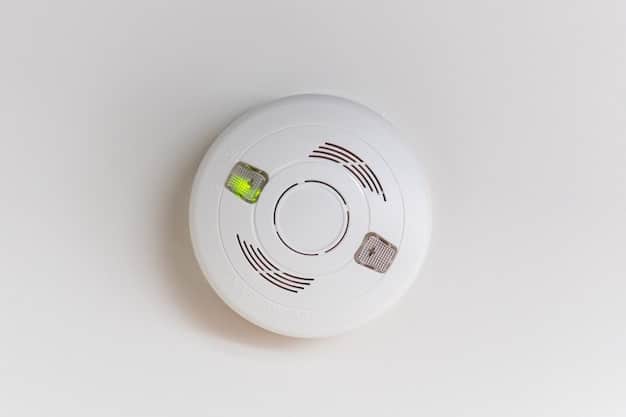
Smart Features
Smart smoke detectors feature several advanced capabilities:
- Wireless Connectivity: Connect to your home’s Wi-Fi network to send alerts to your smartphone and integrate with other smart devices.
- Voice Alerts: Provide clear, spoken warnings instead of a loud beep, which can be especially helpful for children and the elderly.
- Interconnectivity: Communicate with other detectors in your home, so if one detects smoke, all detectors will sound the alarm.
- Self-Testing: Automatically test their functionality and battery life, alerting you to any issues.
By integrating smart technology with traditional detection methods, these devices offer a more reliable and user-friendly approach to home safety.
Potential Drawbacks of Smart Smoke Detectors
While smart smoke detectors offer numerous benefits, it’s important to consider their potential drawbacks before making a purchase. These can range from cost considerations to concerns about privacy and technical issues.
Here are some common concerns associated with smart smoke detectors:
Cost
Smart smoke detectors typically cost more than traditional models. The initial investment can be a significant factor for some homeowners, especially when multiple detectors are needed to cover the entire house. It’s important to weigh the cost against the added benefits and features to determine if the upgrade is worth the expense.
Privacy Concerns
Smart devices that connect to the internet can raise privacy concerns. Some smart smoke detectors collect data about your home environment, such as temperature and air quality. While this data is often used to improve the device’s performance, it could potentially be shared with third parties. Review the manufacturer’s privacy policy to understand how your data is being used.
Technical Issues
Like any electronic device, smart smoke detectors can experience technical issues. Connectivity problems, software glitches, and compatibility issues with other smart home devices can sometimes occur. Regular maintenance and troubleshooting may be required to ensure optimal performance.
Despite these potential drawbacks, many homeowners find that the benefits of enhanced safety, real-time alerts, and reduced false alarms outweigh the costs and concerns. Careful consideration of these factors will help you make an informed decision about whether smart smoke detectors are the right choice for your home.
How to Choose the Right Smart Smoke Detector
Selecting the right smart smoke detector involves considering several factors to ensure it meets your specific needs and preferences. With a variety of models and features available, it’s important to do your research and make an informed decision.
Here are some factors to consider when choosing a smart smoke detector:
Detection Technology
- Photoelectric vs. Ionization: Decide whether you prefer photoelectric, ionization, or dual-sensor technology based on the types of fires you’re most concerned about.
- Sensor Accuracy: Look for detectors with advanced sensors that minimize false alarms.
Smart Features
- Smartphone Connectivity: Ensure the detector is compatible with your smartphone operating system and offers reliable alerts.
- Voice Alerts: Consider voice alerts for clearer communication, especially for children and the elderly.
- Integration with Other Devices: Check if the detector can integrate with other smart home devices, such as smart lights and security systems.
Installation and Maintenance
Consider these points when choosing a smart smoke detector:
- Ease of Installation: Look for detectors that are easy to install and come with clear instructions.
- Battery Life: Check the battery life and whether the detector uses replaceable batteries or a long-lasting sealed battery.
- Self-Testing: Opt for detectors that automatically test their functionality and battery life.
By carefully evaluating these factors, you can choose a smart smoke detector that provides reliable protection and integrates seamlessly into your smart home ecosystem.
Installation and Maintenance Tips
Proper installation and maintenance are essential for ensuring your smart smoke detectors function correctly and provide reliable protection. Following these tips will help you maximize their effectiveness and longevity.
Here are some important installation and maintenance guidelines:
Installation Tips
To ensure proper functionality, consider the following installation tips:
- Placement: Install smoke detectors on every level of your home, inside and outside bedrooms, and in hallways.
- Ceiling or Wall: Mount detectors on the ceiling or high on the wall, following the manufacturer’s instructions.
- Avoid Obstructions: Ensure detectors are not obstructed by furniture, curtains, or other objects that could block airflow.
Maintenance Tips
- Regular Testing: Test your smoke detectors monthly by pressing the test button.
- Battery Replacement: Replace batteries at least once a year, or as indicated by the detector.
- Cleaning: Clean detectors regularly with a vacuum cleaner to remove dust and debris that could affect their performance.
Troubleshooting
These points are important to consider:
- False Alarms: If you experience frequent false alarms, try relocating the detector away from sources of steam or cooking fumes.
- Connectivity Issues: Check your Wi-Fi connection and ensure the detector is within range of the router.
- Error Messages: Refer to the manufacturer’s manual for troubleshooting specific error messages.
By following these installation and maintenance tips, you can ensure that your smart smoke detectors provide reliable protection and keep your home safe from fire and carbon monoxide hazards.
| Key Point | Brief Description |
|---|---|
| 📱 Smartphone Alerts | Receive real-time notifications on your phone, even when you’re away. |
| 🔥 Fewer False Alarms | Advanced sensors reduce nuisance alarms from cooking or steam. |
| 🗣️ Voice Alerts | Clear, spoken warnings instead of a loud beep. |
| 🛡️ Interconnectivity | Connect with other smart devices for comprehensive safety. |
Frequently Asked Questions
▼
Smart smoke detectors offer enhanced features like smartphone alerts and fewer false alarms, providing added convenience and safety. Consider if these benefits justify the higher price for your needs.
▼
Installation typically involves mounting the detector on the ceiling or wall and connecting it to your Wi-Fi network. Follow the manufacturer’s instructions for specific steps and safety precautions.
▼
Yes, many smart smoke detectors use advanced sensors to differentiate between smoke and common triggers like steam or cooking fumes, significantly reducing the frequency of false alarms.
▼
Most smart smoke detectors will still function as traditional detectors, sounding an alarm if smoke is detected. However, smartphone alerts and remote monitoring will not be available until the Wi-Fi is restored.
▼
It is recommended to test your smart smoke detector monthly by pressing the test button to ensure it is functioning correctly and that you can hear the alarm. Also, replace batteries annually.
Conclusion
In conclusion, smart smoke detectors offer numerous advantages over traditional models, including real-time alerts, reduced false alarms, and integration with other smart home devices. While they come with a higher price tag and potential privacy concerns, the enhanced safety and convenience they provide may make them a worthwhile upgrade for many homeowners.


